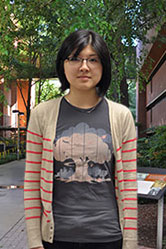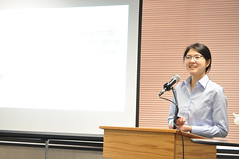Chemical Engineering

What research experiences have you had?
I participated in Research Experience for Undergraduates (REU) programs in the summer of 2013 and 2014. In 2013, I worked at the University at Buffalo, NY to develop a solid-phase extraction (SPE) method and to analyze the concentrations of estrogen and estrogen derivatives in livestock manure from local animal operations. The 2014 REU program I was involved in was at Duke University, NC. There, I researched the rejection of octanol and octane by polyvinylidene fluoride (PVDF) membranes.
Who is your mentor for your research, scholarship, or artistic project? How did you arrange to work with this person?
I contacted Dr. Lee Blaney from the Department of Chemical, Biochemical, and Environmental Engineering in the summer of 2013. At that time, I was at the University at Buffalo, NY for the REU program. I was working on SPE method development, and I wanted to continue with similar research once I returned to UMBC. I browsed through some of the professors in the UMBC department and saw that Dr. Blaney’s research also involved mass spectrometry and SPE, so I sent him an email indicating my interest.
How did you hear about the Undergraduate Research Award (URA) program? What academic background did you have before you applied for the URA?
When I was in my junior year, Dr. Blaney encouraged me to apply for the URA program. He was confident in my ability to become a URA scholar.
How much did your mentor help you with the application?
I had free reign over the contents of my project, but Dr. Blaney was of indispensable help when I was diting my abstract. The application was challenging in the sense that I was proposing a project that I had done little preliminary work on.
What has been the hardest part about your research?
In regards to the URA project, the hardest part was receiving results that indicated a “dead end”. One of the compounds I had chosen for my URA project was not suitable for my experiments, and I had difficulty finding a replacement; I have a lot of unused results to show for it. However, it is important to keep in mind that data is not useless just because something did not turn out the way you intended it to. It shows that the selected methodology is not efficient or does not work for that particular situation, which is an important finding in and of itself.

What was the most unexpected thing?
Dr. Blaney has a rule when people present their progress or work, or when we critique journal articles as a group during weekly meetings: everyone in the lab group must ask at least one question. Achieving this goal was somewhat difficult in the beginning, but the practice forced me to critically assess methodology and results. The actual task does not sound like much, but I highly benefitted from it. I was allowed to question the validity of key assumptions, experimental design, and soundness of the conclusion of studies other than mine. This in turn helped me critique my own work in a more objective fashion and enabled me to develop further as an independent researcher.
The runner-up answer to this question would be the feeling I got when I realized that my work was published! To have actually done the experiments and analyzed data, and then to see those results in a published journal article, is quite the feeling. I cannot thank Dr. Blaney, Kiranmayi Mangalgiri, and Dr. Asok Adok enough for their work and support.
What is your advice to other students about getting involved in research?
If you are interested in research, speak up! Talk to your advisor or contact a professor whose research interest you, even if you do not have prior experience. Everyone has to start somewhere, and professors recognize promising students. I strongly suggest checking out NSF’s Research Experience for Undergraduates (REU) programs, which enable undergraduates to research alongside graduate students from different universities.
What are your career goals?
I plan to work in industry directly after graduation, but I may work towards a Ph.D. in chemical or environmental engineering in the future.